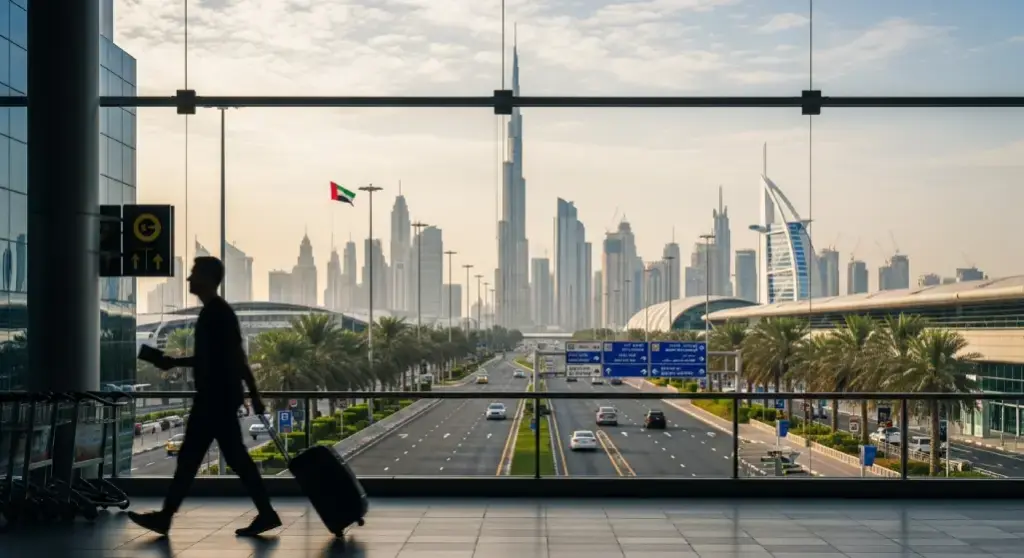Moving to the UAE is an exciting step — whether for work, business, or a new lifestyle. The Emirates offer world-class infrastructure, safety, cultural diversity, and unmatched career opportunities. But the first week after landing can feel overwhelming if you’re not prepared. This detailed relocation checklist will help you get settled smoothly, understand local systems, and avoid common mistakes most newcomers make.
1. Get Your Essential Documents in Order
Your first priority should be ensuring all legal and identification documents are ready and accessible. Without these, you’ll face delays in opening bank accounts, getting a SIM card, or completing residence formalities.
Essential documents to carry:
- Passport with valid residence visa (or entry permit if waiting for visa stamping)
- Emirates ID (or receipt if still under processing)
- Employment contract and offer letter
- Attested educational certificates (if required for your job)
- Marriage certificate (for family sponsorship)
- Passport-sized photographs (at least 10 copies)
Tip: Keep both digital and hard copies. Store digital versions securely on your phone or cloud storage for easy access.
2. Arrange Your Temporary and Long-Term Accommodation
Finding a place to live is a top priority. Many newcomers spend their first few weeks in temporary accommodation (like hotel apartments or Airbnb) while they explore long-term housing options.
Temporary stay tips:
- Book close to your workplace or metro line for convenience.
- Hotel apartments are ideal if you need kitchen access.
- Ask your employer if they offer relocation housing for the first month.
Long-term accommodation choices:
- Apartments: Common in Dubai, Abu Dhabi, and Sharjah. Choose based on proximity to transport and amenities.
- Villas/Townhouses: Preferred by families; found in suburban communities.
- Shared housing: Cost-effective option for singles or freelancers.
Budget estimate:
- Studio apartments start around AED 25,000–40,000/year.
- One-bedroom apartments can range AED 45,000–70,000/year depending on location.
Before signing any lease:
- Check DEWA (electricity/water) connection process.
- Verify if maintenance and chiller charges are included.
- Confirm nearby public transport options.
3. Get a Local SIM Card and Internet Connection
Having a working phone number is essential for communication, banking verification, and delivery services.
Main telecom providers:
- Etisalat
- du
- Virgin Mobile
You’ll need:
- Passport copy
- Visa or Emirates ID (some plans require valid residency)
Tip: Prepaid SIMs are easiest for newcomers until your Emirates ID is issued. Once you have it, switch to a postpaid plan for better rates.
4. Set Up Your Bank Account
Most banks require a residence visa and Emirates ID to open an account. However, some banks offer limited accounts for those on entry visas.
Popular banks in the UAE:
- Emirates NBD
- ADCB
- Mashreq
- FAB (First Abu Dhabi Bank)
- RAKBANK
Checklist:
- Original passport + residence visa
- Emirates ID or application slip
- Salary certificate or employment contract
- Initial deposit (usually AED 3,000–5,000)
Pro Tip: Ask your HR department for preferred partner banks — this can speed up salary account setup.
5. Learn the Basics of Transportation
During your first week, understanding how to move around the city will save time and money.
Public Transport:
- Dubai Metro — Fast, clean, and connects major areas.
- Buses and trams — Operate across all emirates.
- Abu Dhabi and Sharjah — Depend more on buses and taxis.
- Use a Nol card (Dubai) or Hafilat card (Abu Dhabi) for seamless travel.
Ride-hailing services:
- Careem, Uber, and Dubai Taxi app are reliable options.
- Taxis are well-regulated and safe.
If you plan to drive:
- Apply for a UAE driving license (some nationalities can directly transfer).
- Learn about Salik tolls and parking systems before purchasing a car.
6. Manage Your Finances Wisely
The UAE offers tax-free income, but living costs can add up quickly. Plan your first-month expenses carefully.
Expected first-week costs:
- Temporary accommodation: AED 1,500–3,000
- Transportation (metro/taxi): AED 150–300
- SIM & utilities setup: AED 150–500
- Groceries: AED 300–600
- Miscellaneous (documents, fees): AED 500–1,000
Tips for smart money management:
- Use budgeting apps like YNAB or Spendee.
- Compare grocery prices at Carrefour, Lulu, and Union Coop.
- Avoid unnecessary subscriptions early on.
7. Understand Local Laws and Etiquette
The UAE is modern but deeply rooted in respect and cultural values. Understanding local laws ensures a smooth transition.
Basic do’s and don’ts:
- Dress modestly in public spaces (especially malls, government offices).
- Avoid public displays of affection.
- Alcohol consumption is only allowed in licensed venues or at home with a permit.
- Always carry identification.
- Avoid photographing people without permission.
- No offensive language or gestures — fines can be steep.
Tip: Friday is the weekly prayer day, and the weekend in the UAE is now Saturday–Sunday.
8. Explore Healthcare Options
Healthcare in the UAE is world-class, but you must ensure your health insurance is active before visiting clinics.
Steps to take in your first week:
- Confirm health insurance activation through your employer.
- Identify nearby hospitals and clinics (Mediclinic, NMC, Aster, etc.).
- Register at a local pharmacy for convenience.
If you bring medication from home, carry:
- A doctor’s prescription
- The original packaging
- Confirmation that the medicine is not restricted in the UAE
9. Get Familiar with Your Workplace and Legal Formalities
If you’ve moved for work, use your first week to settle into your job and complete employment paperwork.
Key steps:
- Sign your final employment contract.
- Complete Emirates ID biometric scanning.
- Register for company medical insurance.
- Collect your labor card (if applicable).
- Learn your company’s leave policy, dress code, and HR contacts.
Tip: Keep a soft copy of your work visa and Emirates ID handy for digital submissions.
10. Start Building a Social and Support Network
Relocating can feel lonely initially, but the UAE’s expat community is warm and diverse.
Ways to connect:
- Join expat Facebook groups (e.g., Expats in Dubai, Abu Dhabi Living).
- Attend community events, fitness classes, or business meetups.
- Explore coworking spaces like Astrolabs, Nasab, or WeWork to meet like-minded people.
Bonus tip: Many UAE cities host cultural festivals and international exhibitions — great for networking and discovering local experiences.
11. Learn Basic Arabic Phrases
While English is widely spoken, knowing a few Arabic words helps in daily interactions and shows cultural respect.
Useful phrases:
- Hello — Marhaban
- Thank you — Shukran
- How much? — Kam al-thaman?
- Yes — Na’am
- No — La
Even a small effort in language goes a long way with locals and service staff.
12. Explore and Enjoy Your New Home
Once the essentials are done, take time to explore! The UAE blends futuristic innovation with rich heritage.
Must-see highlights:
- Dubai: Burj Khalifa, Old Dubai, Dubai Marina
- Abu Dhabi: Sheikh Zayed Grand Mosque, Louvre Abu Dhabi
- Sharjah: Cultural museums and corniche
- Ras Al Khaimah: Beaches and mountain hikes
Plan small weekend trips to understand the country’s geography and culture better.
Final Thoughts
Your first week in the UAE can shape your entire relocation experience. Plan ahead, stay organized, and take one step at a time. Remember, everyone feels overwhelmed in the beginning — but with the UAE’s modern infrastructure, expat-friendly systems, and safety, you’ll feel at home faster than you expect.
Whether you’re moving for work, family, or adventure, this checklist ensures your first week is smooth, stress-free, and successful.










